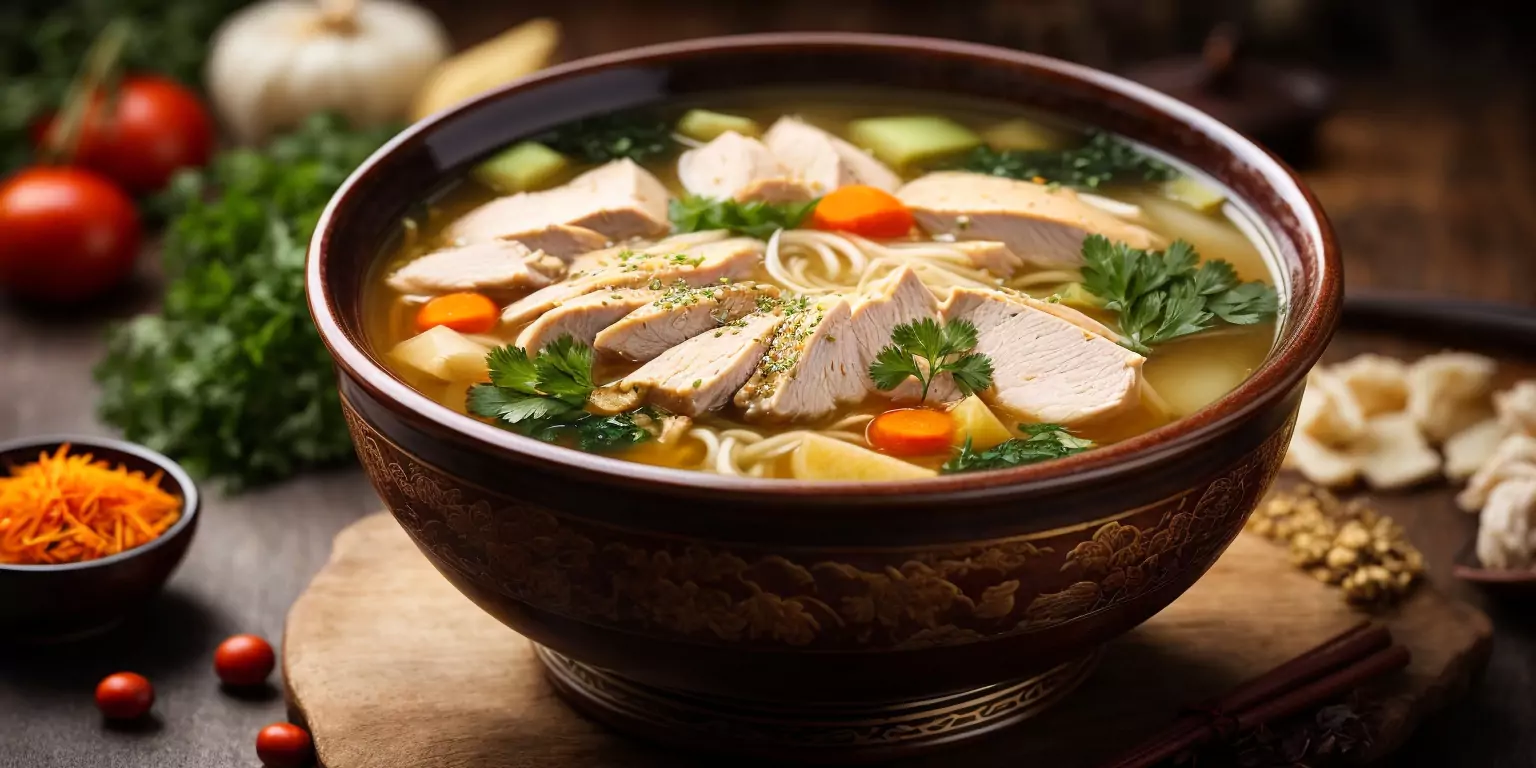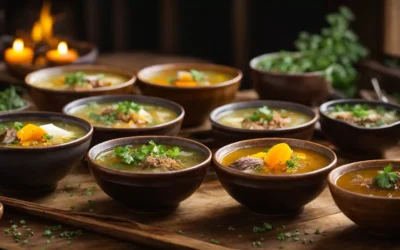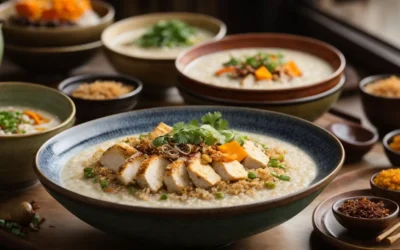Did you know that TCM soups have been a cornerstone of traditional Chinese medicine for centuries? These time-honored recipes not only offer delicious flavors but also hold significant cultural and health value. In this post, we delve into the rich history and cultural significance of TCM soup recipes, exploring how they seamlessly blend taste with therapeutic benefits. From the art of balancing flavors to harnessing the healing properties of ingredients, let’s uncover the secrets behind these nourishing concoctions.
- The Foundations of Traditional Chinese Medicine Soups
- Herbal Chicken Soup Recipe – A TCM Staple
- The Role of Chinese Herbs in TCM Soups
- Four Herbs Soup (Si Shen Tang) – A Deep Dive
- Crafting Your Own Chinese Herbal Soup Mix
- Health Benefits of TCM Soups Explained
- Seasonal Adaptations in Traditional Chinese Soup Making
- Where to Source Ingredients for TCM Soups
- Conclusion on the Art of TCM Soups
- Frequently Asked Questions
The Foundations of Traditional Chinese Medicine Soups
Yin and Yang in TCM Soup Preparation
In TCM soup recipes, the balance between yin and yang is crucial. Yin represents cooling, while yang signifies heat. When preparing herbal soups, it’s essential to incorporate ingredients that balance these opposing forces. For instance, using pork bones as a base adds warmth (yang) to the soup while adding cooling herbs like chrysanthemum flowers introduces a yin element. The goal is to create harmony within the body by balancing yin and yang through food. By understanding this principle, individuals can tailor their soups to address specific health concerns or imbalances in the body.
Seasonal Ingredients in TCM Soup Recipes
Another fundamental aspect of traditional Chinese medicine soups is utilizing seasonal ingredients. According to TCM principles, consuming foods that align with each season’s energy helps maintain overall well-being. For example, incorporating water-based vegetables like cucumber during summer or root vegetables such as carrots during winter supports the body’s natural rhythms. By embracing seasonal produce when crafting herbal soups, individuals can harness nature’s healing properties and adapt their diet according to environmental changes for optimal health benefits.
Balancing the Five Elements in TCM Soup Making
In traditional Chinese medicine, achieving equilibrium among the five elements—wood, fire, earth, metal, and water—is vital for maintaining holistic wellness. Each element corresponds to specific organs and bodily functions; therefore, incorporating ingredients associated with these elements into soups can promote balance within the body. For instance:
- Including bitter greens (wood element) supports liver function.
- Adding pungent spices like ginger (fire element) aids digestion.
- Incorporating hearty grains such as barley (earth element) nourishes spleen energy.
Herbal Chicken Soup Recipe – A TCM Staple
Key Healing Properties
Herbal chicken soup is a staple in Traditional Chinese Medicine (TCM), known for its nourishing and healing properties. The combination of herbs, broth, and ingredients like honey dates, carrots, and pork creates a meal that promotes overall wellness. The herbs used in TCM soups are carefully selected for their specific health benefits. For example, goji berries are known to support eye health, while red dates help improve blood circulation. These ingredients work synergistically to address various aspects of well-being such as immunity, digestion, and energy levels.
Crafting the Recipe
Crafting a simple yet effective herbal chicken soup recipe involves combining these key ingredients with care. For instance, simmering the pork bones with water over low heat extracts essential nutrients into the broth. Adding honey dates not only enhances sweetness but also contributes to the soup’s medicinal value. To maximize the healing properties of this TCM staple, it’s important to use fresh carrots which provide an additional dose of vitamins and minerals. By understanding how each ingredient works within the body according to TCM principles, you can create a flavorful broth that supports holistic wellness.
Herbal Chicken Soup Recipe
Ingredients:
- 1 whole chicken, cut into pieces
- 10 cups water
- 5 honey dates
- 2 carrots, chopped
- 1 pound pork bones
- 2 tbsp goji berries
- 5 red dates
Instructions:
- In a large pot, add the pork bones and water. Simmer over low heat for 1-2 hours to extract nutrients into the broth.
- Add the chicken pieces, honey dates, red dates, and goji berries to the pot.
- Simmer for an additional 1-2 hours until the chicken is fully cooked and the flavors have melded together.
- Add the chopped carrots and continue to simmer for 15-20 minutes until the carrots are tender.
- Season with salt and pepper to taste, then serve hot.
Variation Tips:
- Add ginger and garlic for an extra immune-boosting kick.
- Swap out the pork bones for beef bones for a heartier flavor.
- For a vegetarian option, omit the chicken and pork bones, and use vegetable broth instead of water for a lighter soup base.
The Role of Chinese Herbs in TCM Soups
Medicinal Properties
Chinese herbs used in TCM soup recipes offer diverse medicinal properties. For instance, goji berries are known to improve eyesight and wolfberries can boost the immune system. Astragalus root is often used for its anti-inflammatory and immune-boosting effects. These herbs play a crucial role in promoting overall health and well-being by addressing specific ailments such as colds, fatigue, or digestive issues. By incorporating these herbs into soups, individuals can harness their healing properties while enjoying a delicious meal.
Concept of “Qi”
In Traditional Chinese Medicine (TCM), the concept of “qi” refers to the body’s vital energy flow. It is believed that when qi is balanced and flowing smoothly, one experiences good health. The Chinese herbs used in TCM soup recipes are selected based on their ability to regulate qi within the body. For example, ginger is often added to TCM soups due to its warming properties that help invigorate qi and promote digestion. Similarly, ginseng is believed to enhance vitality by nourishing qi within the body.
Four Herbs Soup (Si Shen Tang) – A Deep Dive
Health Benefits
TCM soup recipes, such as Four Herbs Soup (Si Shen Tang), have been integral to traditional Chinese medicine for centuries. Each herb in Si Shen Tang offers specific health benefits. For instance, Huang Qi is known to boost the immune system, Bai Zhu aids digestion, Shan Yao supports respiratory health, and Dang Gui promotes blood circulation. These herbs are carefully selected and combined to create a harmonious blend that targets multiple aspects of well-being. The synergistic effects of these herbs make Si Shen Tang a potent remedy for various health conditions.
Crafting Traditional Recipe
Crafting a traditional recipe for Si Shen Tang involves precise measurements and techniques passed down through generations. One popular variation includes adding jujubes or goji berries for added sweetness and nourishment. This enriches the flavor profile while enhancing its nutritional value. The significance of this soup lies not only in its taste but also in its ability to restore balance within the body according to TCM principles.
Si Shen Tang Soup Recipe:
Ingredients:
- 15g Huang Qi (Astragalus Root)
- 15g Bai Zhu (White Atractylodes)
- 15g Shan Yao (Chinese Yam)
- 10g Dang Gui (Chinese Angelica Root)
- 5-6 cups of water
- Optional: 5-6 jujubes or goji berries for added sweetness and nourishment
Instructions:
- Rinse all the herbs under cold water to remove any impurities.
- In a large pot, add the herbs and water.
- Bring the water to a boil, then reduce the heat and let it simmer for 2-3 hours until the liquid reduces to about 3 cups.
- Strain the herbs from the soup and discard them.
- Serve hot and enjoy the nourishing benefits of Si Shen Tang.
Variation Tips:
- To enhance the flavor, you can add a few slices of ginger or a few cloves of garlic while simmering the soup.
- For a more warming effect, consider adding a small amount of cinnamon or dried tangerine peel.
- If you prefer a sweeter taste, you can add rock sugar or honey to the soup before serving.
Crafting Your Own Chinese Herbal Soup Mix
Personalized Creations
Creating tcm soup recipes allows individuals to tailor their herbal mix based on their specific needs. This empowers them to address unique health concerns or simply enjoy flavors they prefer. By crafting homemade soup mixes, people can take charge of their well-being and explore the art of traditional Chinese medicine. Crafting a herbal mix for TCM soups involves understanding the synergistic effects of different herbs. Each herb contributes its own medicinal properties, and when combined properly, they work together to enhance overall health benefits. For instance, combining goji berries with red dates in a soup mix creates a harmonious blend that nourishes the blood and boosts energy levels.
Sourcing High-Quality Herbs
When sourcing ingredients for tcm soup recipes, it’s crucial to obtain high-quality Chinese herbs. Opting for reputable suppliers ensures the purity and authenticity of the herbs, guaranteeing maximum effectiveness in creating homemade soup mixes. Whether using an instant pot, slow cooker, or simmering on the stove, high-quality ingredients are essential for achieving optimal flavor and medicinal benefits.
Health Benefits of TCM Soups Explained
Immune Support
TCM soups are renowned for their ability to bolster the immune system. The combination of herbs and ingredients in these soups can help strengthen the body’s natural defense mechanisms, making it more resilient to infections and illnesses. For example, soups containing astragalus root have been shown to enhance immune function, protecting the body from common colds and flu. The traditional Chinese herbal soup mix mentioned in the previous section contains ingredients like goji berries, which are rich in antioxidants that support overall health. These antioxidants help combat free radicals in the body, reducing oxidative stress and promoting a stronger immune response.
Digestive Aid
Individuals struggling with digestive problems can also benefit from TCM soups. The gentle yet effective nature of these soups makes them ideal for soothing digestive discomfort and promoting better gut health. For instance, ginger is often used in TCM soup recipes for its anti-inflammatory properties that aid digestion and alleviate nausea. Moreover, ingredients such as red dates or lotus seeds commonly found in TCM soup mixes can provide essential nutrients while supporting digestive functions. Red dates contain fiber that aids digestion by preventing constipation, while lotus seeds are known to soothe the stomach lining.
Seasonal Adaptations in Traditional Chinese Soup Making
Warming vs. Cooling Soups
In Traditional Chinese Medicine (TCM), the concept of “warming” and “cooling” soups plays a crucial role in adapting soup recipes according to seasonal changes for optimal wellness. During colder months, warming soups are favored as they help to dispel cold and warm the body from within. These soups typically include ingredients like ginger, garlic, and lamb, known for their warming properties. On the other hand, during warmer seasons, cooling soups are preferred to reduce internal heat and cool down the body. These cooling soups often contain ingredients such as mung beans, bitter melon, and watercress. Warming soups are ideal for winter when our bodies need extra warmth due to the cold weather outside. For instance, a classic TCM recipe like “Ginseng Chicken Soup” is considered a perfect choice during winter months because ginseng is believed to have warming properties that can help strengthen the immune system when it’s chilly outside.
Seasonal Ingredients in TCM Soup Making
Specific ingredients play a vital role in traditional Chinese soup making based on different seasons. For example:
- In autumn: Root vegetables like carrots and sweet potatoes are commonly used in TCM soup recipes as they provide nourishment while helping the body adjust to cooler temperatures.
- In summer: Lighter ingredients such as lotus seeds or lily bulbs are often included in cooling soups to counteract heatiness caused by hot weather.
Where to Source Ingredients for TCM Soups
Identifying Reputable Sources
Sourcing authentic Chinese herbs and ingredients is crucial. Look for reputable suppliers known for their high-quality products. Check for certifications and customer reviews to ensure authenticity. It’s important to procure herbs from trusted sources that adhere to strict quality standards. For example, renowned herbal shops or online stores specializing in traditional Chinese medicine are reliable options. These sources often have a wide selection of authentic ingredients needed for TCM soups.
Tips for Selecting Fresh Produce
To create an authentic TCM soup, fresh and high-quality produce is essential. When selecting vegetables and meat, prioritize organic options free from pesticides and antibiotics. Opt for locally sourced items whenever possible as they are likely fresher. For Chinese herbs, choose those with vibrant colors and strong aromas – signs of freshness and potency. Avoid wilted or discolored herbs as they may have lost their medicinal properties.
Exploring Online and Local Resources
Exploring both online platforms and local resources can help in obtaining specialized ingredients used in traditional Chinese medicine soups. Online retailers often offer a wide range of rare Chinese herbs not easily found at local stores. Local Asian markets or specialty grocery stores can also be great places to find unique TCM soup ingredients such as goji berries, dried tangerine peel, or lotus seeds.
Conclusion on the Art of TCM Soups
Nourishing Soups
TCM soup recipes are not just about food; they embody a rich tapestry of culture, culinary expertise, and health wisdom. These soups are crafted to nourish the body, warm the stomach, and balance the yin and yang energies. By embracing these recipes, individuals can tap into centuries-old knowledge that promotes overall well-being. Traditional Chinese Medicine emphasizes the concept of warming foods to support digestion and strengthen the body. Soup is considered an ideal way to achieve this as it involves slow cooking over low heat, allowing the ingredients to release their essence into the pot. The resulting broth is not only flavorful but also rich in nutrients that are easily absorbed by the body. For instance, a classic TCM soup might include ingredients like ginger, goji berries, and Chinese yam to promote vitality and nourish the body.
Timeless Relevance
The adaptability of TCM soup recipes makes them relevant even in modern times. Amidst busy schedules and fast-paced lifestyles, these soups offer a way to slow down and savor a comforting, nourishing meal. They provide an opportunity for individuals to reconnect with traditional culinary practices that prioritize holistic wellness. Moreover, these soups can be customized to address specific health concerns such as dampness or coldness in the body, making them a versatile and valuable addition to one’s diet.
- TCM soups embody cultural heritage and wisdom
- Slow cooking over low heat enhances nutrient absorption
- Soups offer a way to reconnect with traditional culinary practices
- Customizable recipes cater to individual health needs
Frequently Asked Questions
What are the health benefits of TCM soups?
TCM soups offer a myriad of health benefits, such as boosting the immune system, improving digestion, and promoting overall well-being. The combination of herbs and ingredients in TCM soups is designed to restore balance and harmony within the body.
Where can I source authentic ingredients for TCM soup recipes?
Authentic ingredients for TCM soup recipes can be sourced from reputable Asian grocery stores, specialized herbal shops, or online platforms that specialize in traditional Chinese medicine herbs and ingredients. It’s essential to ensure the quality and authenticity of the ingredients for optimal results.
How do I adapt TCM soup recipes based on seasonal changes?
Adapting TCM soup recipes based on seasonal changes involves incorporating seasonal produce and adjusting herbal combinations to align with specific health needs during different times of the year. This practice ensures that the soups remain harmonious with nature’s rhythms while catering to individual wellness requirements.
Why are Chinese herbs integral to traditional Chinese medicine soups?
Chinese herbs play a vital role in traditional Chinese medicine (TCM) soups by providing therapeutic properties that target various aspects of well-being. These herbs are carefully selected and combined to create synergistic effects that support specific health goals, making them integral to TCM soup recipes.
How can I craft my own personalized Chinese herbal soup mix?
Crafting your personalized Chinese herbal soup mix involves understanding your unique wellness needs, consulting with a qualified practitioner knowledgeable about traditional Chinese medicine (TCM), selecting suitable herbs based on your constitution, and creating balanced combinations tailored specifically for you.










